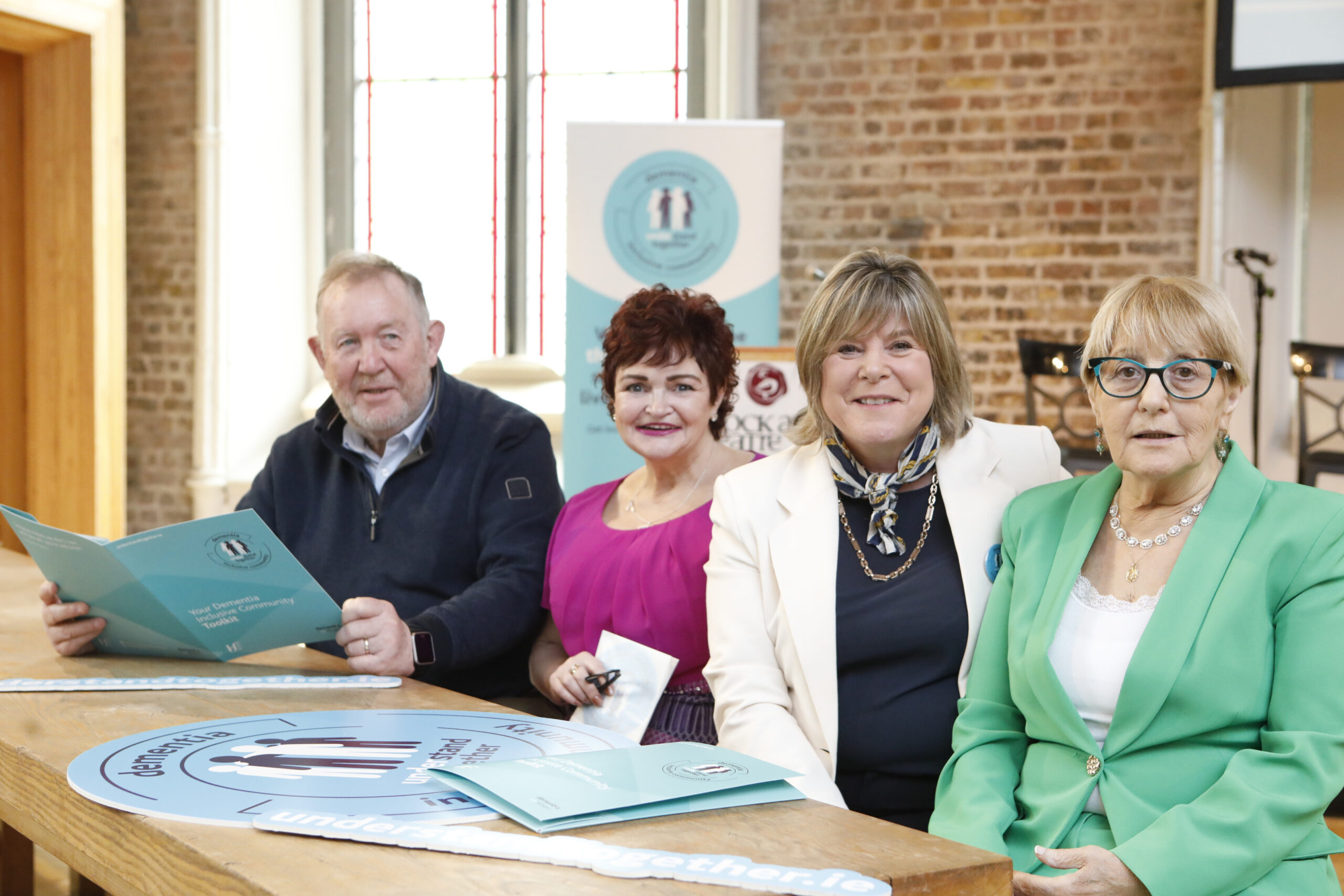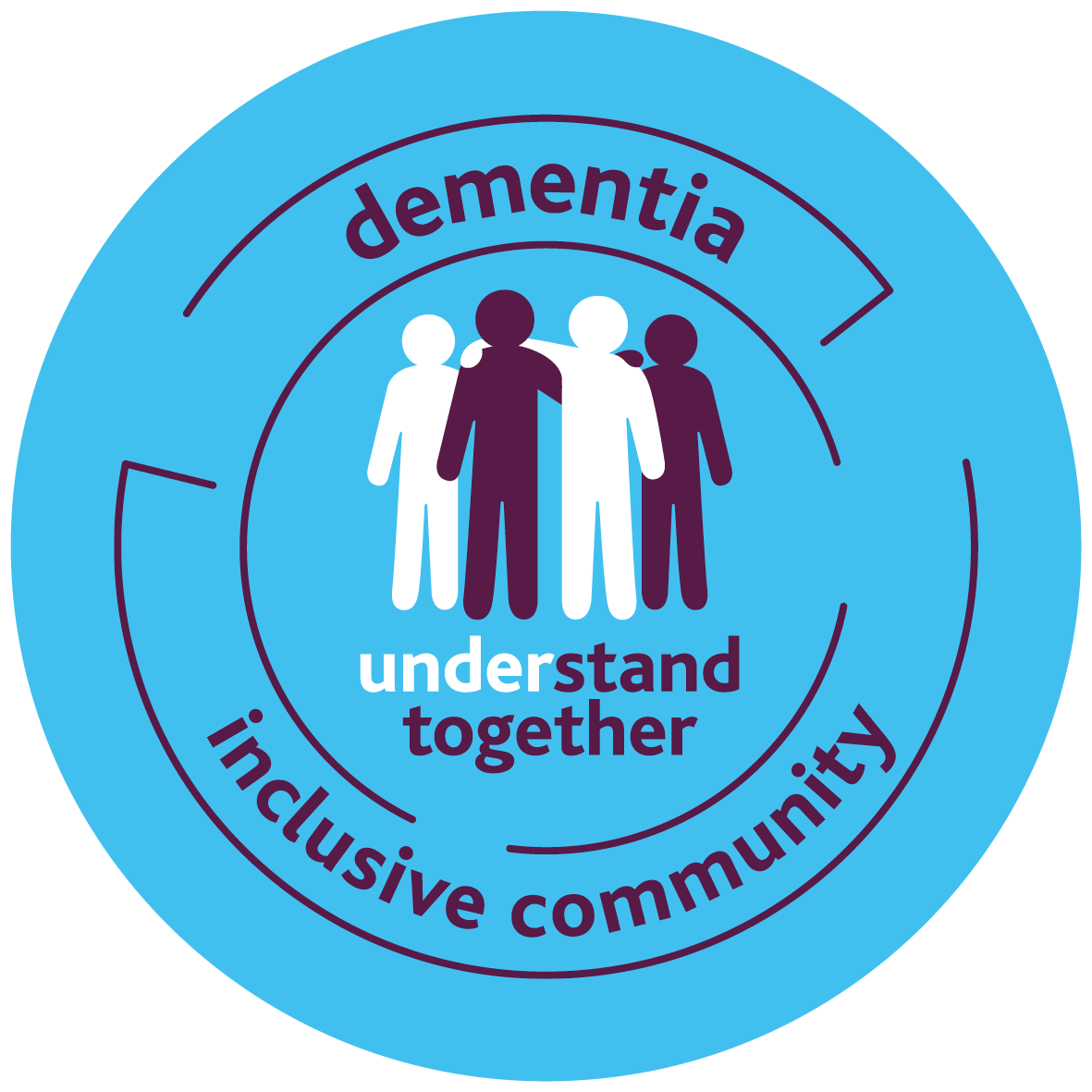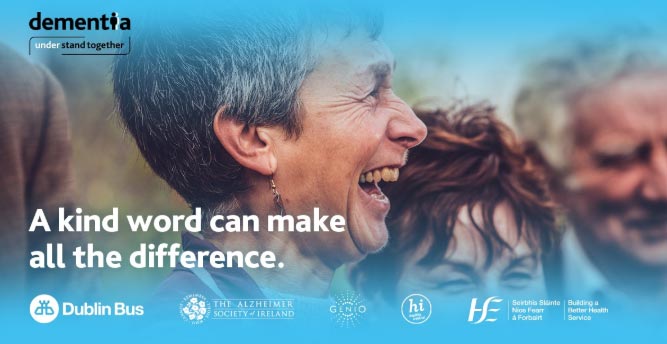Understand Together

Mary Butler TD., Minister for Older People and Mental Health, and IDWG Members and UT Ambassadors Gerry Paley, Marguerite Keating, and Kathleen Farrell Pictured at the launch of the new dementia inclusive communities symbol in Smock Alley Theatre.
Update: March 27th, 2023.
Dementia: Understand Together launch new dementia inclusive community symbol
We’re proud to be part of the Dementia: Understand Together campaign and support the launch of the new dementia-inclusive community symbol.
The symbol has been developed with people with dementia at its heart. By displaying the symbol in our communities, it’s hoped that organisations and services will help to raise awareness for dementia and also show solidarity with more than 64,000 people living with the condition in Ireland.
We will be joining 40 partners, ranging from voluntary and community groups, health services and academia to retail, transport and financial services and over 500 community champions nationally to take action to help support people with dementia, their families and friends.
As well as displaying and using the symbol on shop fronts, windows, websites, newsletters and social media, partners and champions are encouraged to participate in dementia awareness training. Staff and volunteers will explore how simple actions can make a real difference to making their services and businesses more accessible, not just to people living with dementia but to everybody living in our diverse communities.
By understanding together, we can make a difference and help people in our communities stay connected and included. If you’d like to join the campaign, you can find out more, complete training and order promotional materials at this link.
About Understand Together
Understand Together is a public support, awareness and information campaign. It aims to inspire people from all sections of society to stand together with the 500,000 Irish people whose families have been affected by dementia.
The ASI is a key partner of the campaign.
The campaign wants to help create an Ireland that embraces and includes people living with dementia and which displays solidarity with them and their loved ones.
The campaign aims to weave a connecting thread through all the vital and committed local services already in place in Ireland and make them easier to find and understand. As well as the website www.understandtogether.ie, the campaign has used advertising and the media to increase awareness.
These are the wide-ranging objectives of the Understand Together campaign:
1. To increase awareness of dementia and its impact on individuals, families and communities.
2. To help communicate the lived experience of people living with dementia and those caring for them.
3. To provide reliable information about dementia and signposting to services and supports to help those living with dementia, those caring for them, health professionals and the general public.
4. To build on and support greater co-ordination of dementia programmes and initiatives across Ireland.
5. To promote the uptake of dementia awareness training and promote information about brain health and ways to prevent dementia
6. To inspire and encourage individuals, businesses and organisations and communities to become involved in taking steps to create inclusive and supportive environments for people with dementia and their loved ones.
7. To promote and highlight the actions of individuals, businesses and communities to support people with dementia and their loved ones.
Understand Together is one of six key elements of the National Dementia Strategy and has been made possible through a funding partnership between the State and The Atlantic Philanthropies. The campaign is led by the HSE’s Health and Wellbeing Division.
Dementia Inclusive Communities
People with dementia are one of the most marginalised, socially excluded and highly stigmatised groups in society. It has been identified that exclusion from communities is all too frequently a consequence of dementia because the person often experiences reduced ability to follow the normal rules of social engagement.
In order to address the exclusion of people living with dementia, a new initiative has emerged on the landscape in the form of dementia-inclusive communities. Essentially, the initiative is about transforming our villages, towns, cities and counties into better places to live for people with dementia.
What is the vision for Dementia Inclusive Communities?
The overall vision is to reconfigure the communities that we all live in and mainstream dementia into everyday life of that community. The vision is to involve all the stakeholders and members of the community to be dementia-inclusive.
What are the key objectives for Dementia-Inclusive Communities?
Identify the key partners, services, activities and businesses within any given community to develop a local map of ‘the people and the place.
Engage with the key stakeholders by increasing their knowledge and understanding of dementia to ensure that it becomes part of the local agenda.
Challenge the stigma, myths and misconceptions around dementia by opening the channels of communication and removing the barriers to change.
Work with local services and businesses to make the community a dynamic and inclusive place for people with dementia, their carers, families and friends to live and work in.
Work together to increase the opportunity for people with dementia and their carers to remain engaged in their chosen activities of life for as long as they wish to.
What is the vision and mission for Dementia-Inclusive Communities?
The overall vision is that people with dementia and their families are respected as independent citizens and are connected, as much as they wish, in understanding and inclusive communities
Our mission is to inspire people to take action to ensure that our communities are respectful, supportive and inclusive of people with dementia and their families.



